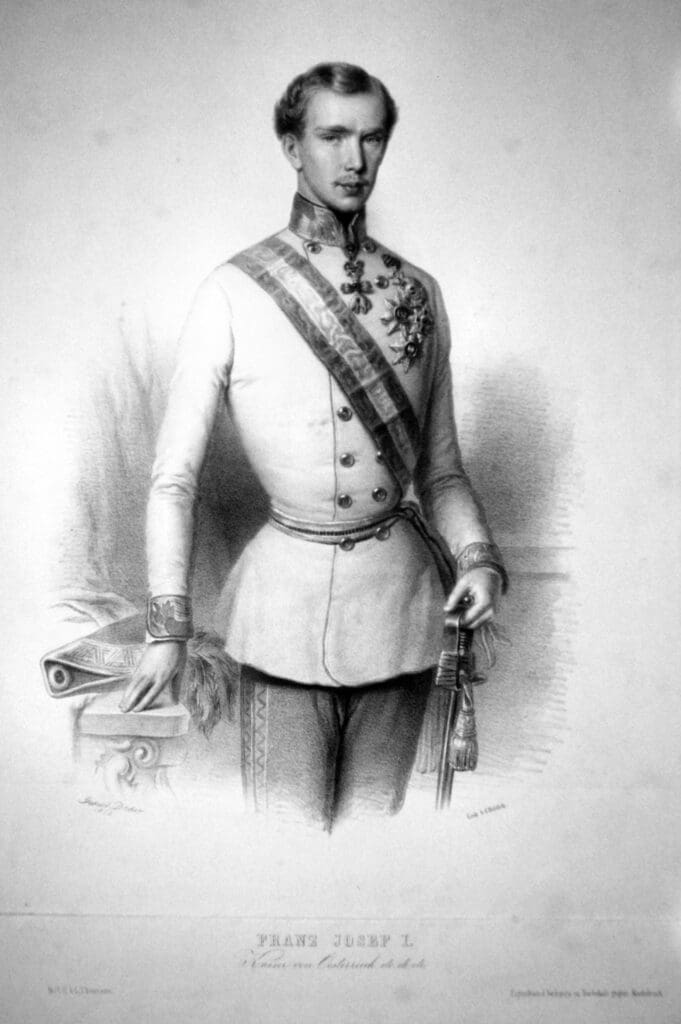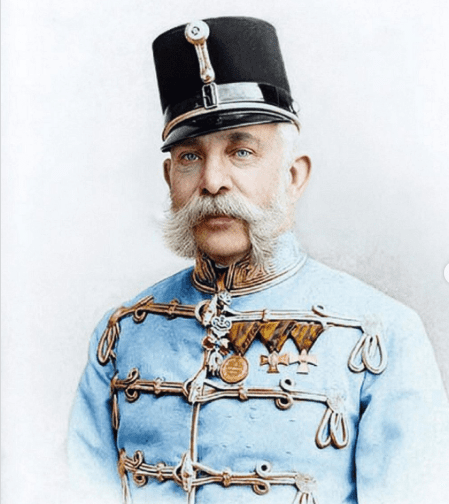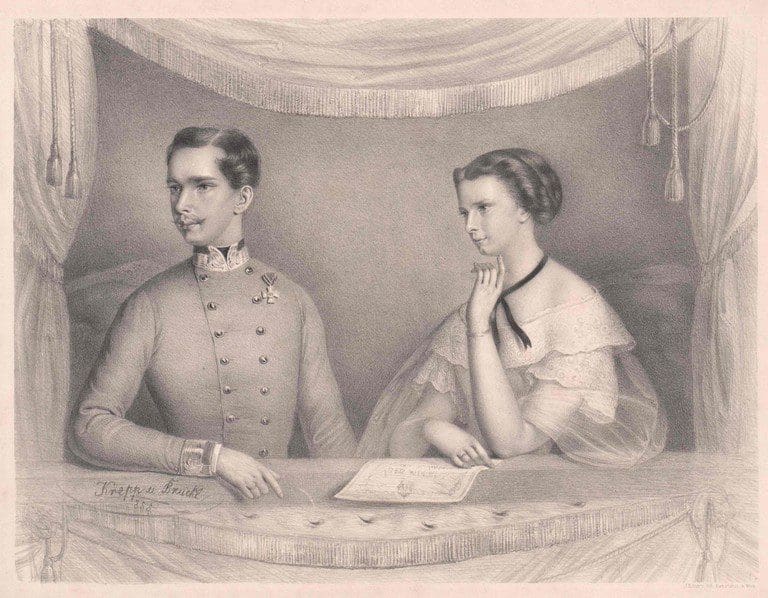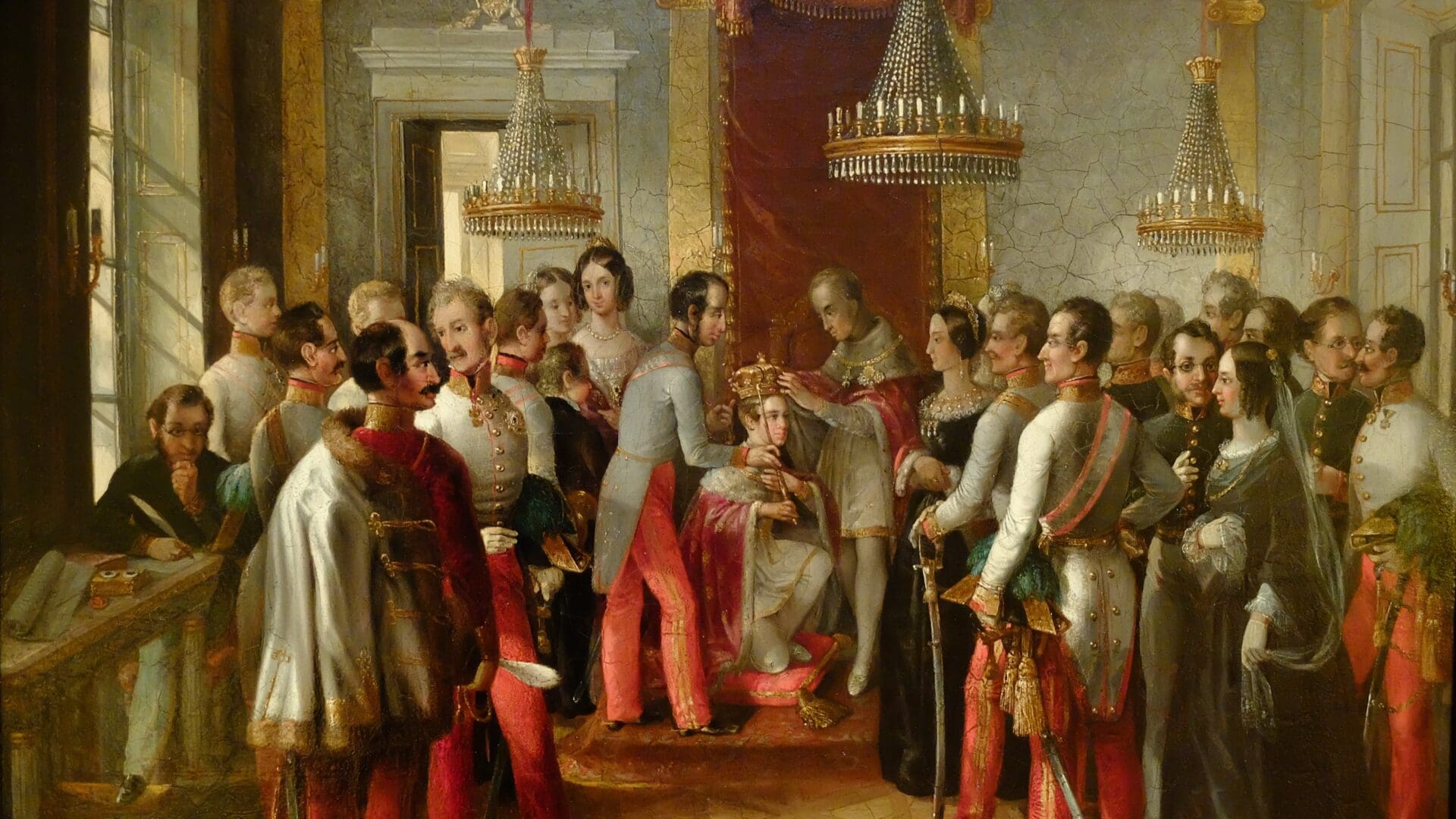Francis Joseph I, King of Hungary, and Emperor of Austria was born on 18 of August, 193 years ago. As one of the longest reigning European and Hungarian monarchs, he has an important place in Hungary’s national memory. Earlier, the mostly kuruc and Protestant historiography condemned him as the ‘butcher of Arad’, and the suppressor of the 1848 Revolution. However, as early as after the 1867 Compromise, and especially since the end of the Communist dictatorship, his assessment has become more positive and his memory nostalgic, as of a symbol of the decades of prosperity of dualist Hungary.
Early Life
Francis Joseph was born in Vienna in 1830. His father was Archduke Franz Karl Joseph, brother of Emperor Ferdinand, and his mother Princess Sophie of Bavaria. In general, her mother was much more dominant than his father, and this is especially true regarding the upbringing of Francis Joseph. Therefore, he was impacted by the Catholic ultraconservative views of her mother, which later hampered making a compromise with the (mainly liberal) Hungarian Diet.
Just like most contemporary princes and aristocrats, Francis Joseph was also ‘homeschooled’, his main tutor being Heinrich Franz von Bombelles. The young prince was taught writing and reading both in German and foreign languages, geography, as well as Catholic religious studies. Despite being opposed to Hungarian independence aspirations, his family also found it important to have him extensively educated in the Hungarian language, culture, and history. It is also noteworthy that Francis Joseph spoke, or at least understood, most of the languages of his future realm by a very young age.
Francis Joseph was a passionate hunter, and was attracted to the military, due to its disciplined and orderly ways. Being made an officer at an early age, he first saw battle when he was 18, during the Italian uprising in 1848. However, he also took part in the minor Battle of Ács, during the 1848 Revolution and War of Independence of Hungary.
An Absolutist Ruler
The Habsburg Empire was in turmoil in 1848. Hungary and the Northern Italian provinces, ruled by the Habsburgs, revolted. Furthermore, the youth of Vienna also rose up, and forced Emperor Ferdinand, or rather, Prince Metternich, who ruled in his name, to disband the government and issue a new constitution. Fearing for their lives, the members of the royal family fled from Vienna to Bohemia. Here, on the initiative of Princess Sophie, the cabal of princes and officials who ruled the empire, commonly known as the camarilla (‘kamarilla’ in Hungarian) removed the sickly and weak-willed emperor, installing Francis Joseph in his place. Therefore, he, at the age of 18, he became the ruler of the Habsburg realm.

During this period, the young emperor was almost entirely under the influence of the camarilla, especially his mother, Sophie. Furthermore, due to his religious and conservative upbringing, he believed himself to be ruling by divine right, and therefore not responsible to any temporal institution. He denounced any attempt to negotiate with the ‘rebels’ whom he thought of as little more than radicals and troublemakers.
In March of 1849, Francis Joseph issued the so called ‘March Constitution’, known in Hungary as the ‘Olmütz Constitution’. This chalked up an amalgam of liberal and conservative ideas, creating a semi-constitutional system with a centralised framework and strong executive imperial powers. It was only officially revoked by the New Year’s Patent on the eve of 1852, which created a de jure absolutist system. However, the empire was never a constitutional monarchy in practice: its system was shaped by absolutistic politicians: Minister President Prince Felix von Schwarzenberg until 1852, and then by Alexander von Bach.
After the Hungarian Revolution was suppressed in August of 1849, Hungary was briefly ruled by General Haynau, also knowns as the ‘Hyena of Brescia’ and the ‘Hangman of Arad’, after which it was integrated into the absolutistic Habsburg framework. All this clearly indicates that the young Francis Joseph was not an autonomous actor. He was strongly influenced by his mother and the politicians around him, while the direction of imperial policy was dictated by rival factions such as the liberal centralists or conservatives.
Prince Schwarzenberg died in 1852, and Francis Joseph did not nominate a new prime minister. Instead, he assumed direct control over daily politics. He was still young, inexperienced, and gullible, but he increasingly centralised power in his own hands during the 1850s. In 1852, he travelled to Hungary, where he declined to meet the representatives of the conservative aristocracy, who asked for the restoration of the constitution. He however was greeted by organised and obedient masses, during staged events. This reaffirmed in him the conviction that his policies were correct, but also showed that he had no personal ill-feeling against Hungary.
Constitutional Ruler
As the Habsburg Empire was increasingly facing crises, both internal, such as an economic downturn and external, including the loss of its Italian territories, Francis Joseph was forced to negotiate with the Hungarian opposition. He opened the Diet of Hungary in 1860, but this first effort led nowhere, giving rise to the so called ‘Schmerling years’ of neo-absolutism. However, in 1867, the Compromise was born, creating the dual, constitutional monarchy of Austria-Hungary.
After the Law of Compromise was enacted in both Hungary and Austria, Francis Joseph swore allegiance to the Hungarian Constitution, and was crowned King of Hungary on 8 June 1867. His chosen motto as ruler of Hungary was ‘Virtuti confido’ (‘My trust (is) in the (ancient) virtue.’).
Francis Joseph had the right to assent to or dismiss laws, and to issue royal decrees. However, his powers were far from the absolutistic ones he enjoyed before 1867. He mostly ruled in agreement with the Hungarian government, even if the fact that he was unwilling to nominate a Prime Minister from the more nationalistic parties made this cooperation easier. Sometimes he was even defeated politically by the Hungarian politicians. For instance, in 1895, he was forced to assent to a new law that legalised non-religious, civic marriage, despite of his objections for fear of the Catholic church losing power.

His main field of interest was foreign policy, where he tried to use his dynastic connections to create strong European alliances and avoid war. He tried to convince both the German and Russian rulers about the necessity of European peace, and in 1914, he went to war only as a last resort. This conflict, the First World War, however, was lost by the Monarchy, resulting in its demise. But Francis Joseph did not live to see the disintegration of his empire. He died on the 21 November 1916, and was buried in the Habsburg Imperial Crypt, the Kapuzinergruft.
Personality
Francis Joseph was deeply impacted by the strict, conservative, and religious education initiated by his mother. He was deeply religious, an observant Catholic, and strongly conservative both politically and personally. He was also hard-working and diligent. His belief in the divine origin of his power was coupled by a sense of duty. Even as a constitutional ruler, he wanted to see and have a say in all details of the lawmaking. Francis Joseph tried to read as many drafts and official papers as he could and sent them back with his annotations and opinion.
This attitude was also mirrored in his daily schedule. He got up very early in the morning, ate a meagre breakfast, often consisting of just a cup of milk, prayed, and exercised, then committed most of his day to work. From morning to dusk, he oversaw government papers and laws-in-making, as well as listened to the detailed reports by his officials and tried to build these into his policies. Francis Joseph was very rigorous in examining these reports and government files. As already noted, he was also drawn to uniforms and the institution of the military in general, and was unwilling to resign from the post of commander-in-chief of the army even after 1867.
There are plenty of anecdotes about the emperor that attest to his rigid and conservative, but at the same time jovial personality. He was reluctant to accept the feats of modern technology, like the telephone and the train. Legend has it that Francis Joseph halted the military development of armoured cars as he witnessed the machines scaring army horses. Visiting the Museum of Fine Arts of Budapest, the emperor-king saw a painting, which displayed the sky being green, instead of blue. The king asked the painter about this, who answered: ‘Your Majesty, I see the sky this way,’ to which Francis Joseph allegedly muttered something like: ‘Then something is surely not alright with your eyesight!’
Francis Joseph had a rather cold and distant relationship with his spouse, Empress-Queen Consort Elisabeth. They preferred to live separately and go on long holidays without each other. Nevertheless, the emperor only had two lovers (one of them being the non-noble Katharina Schratt), instead of committing regular adultery. However, he and Elisabeth still managed to have four children, even if none of them inherited the throne, as their only son, heir apparent Archduke Rudolf committed suicide in 1889. As a result, the position was assumed by Prince Franz Ferdinand, and upon his murder, by Emperor Karl I (King Charles IV of Hungary) who succeed Francis Joseph on the throne in 1916.

Legacy
The legacy of Francis Joseph is mixed. Protestant and kuruc historiography saw him as the suppressor of the revolution and blamed all the post-revolutionary retaliation on him. However, during the dualist period, he became more and more accepted by the wider public. According to Hungarian historian and Habsburg researcher András Gerő, while the Protestant nobility was hostile toward him, and the aristocracy and lower classes remained largely neutral, the lower-middle class, and the class of officials and intellectuals grew increasingly nostalgic toward the aging ruler, especially after his death and the disintegration of the monarchy. After all, it was during his rule was that Hungary last saw peace in its full territorial extension before the Treaty of Trianon. Rather interestingly, Francis Joseph was not personally attacked by the Communist regime, at least not on a popular and propaganda level. This helped that during the 1990s, his status as a positive historical figure was stabilised.
Francis Joseph is today mostly a revered symbol of the so called ‘happy peace years’, meaning the stability and prosperity of Austria-Hungary. Unmarred by political factionalism, which pollutes the legacy of other historical figures, he remains a benevolent father figure in the popular memory.
Related articles:








